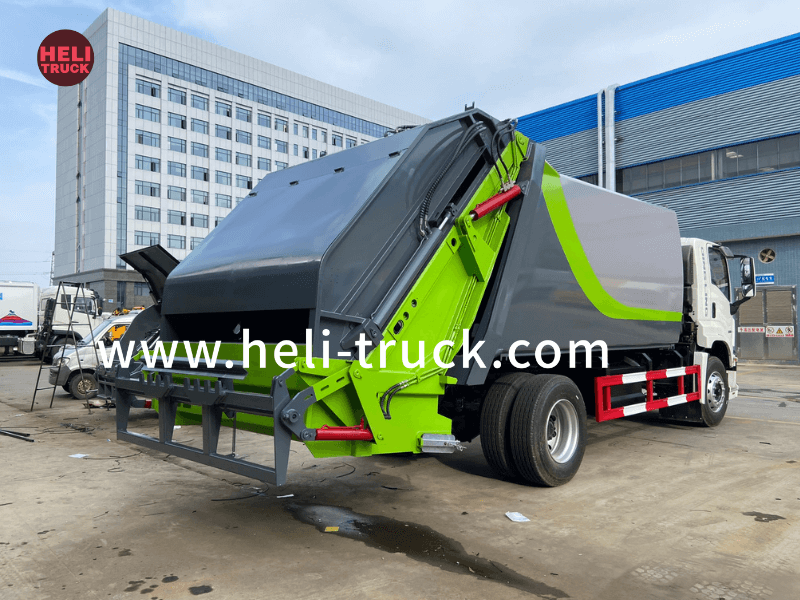Maximizing Efficiency and Sustainability with Garbage Compactor Trucks for Commercial Use
Introduction In today's modern world, the management of waste and garbage has become a critical issue for municipalities, businesses, and individuals alike. The increasing population and urbanization have led to a significant rise in the amount of waste generated, necessitating innovative solutions for its collection and disposal. Garbage compactor trucks have emerged as a crucial tool in this regard, offering a convenient and efficient way to collect, transport, and compact solid waste. In this article, we will explore the various aspects of garbage compactor trucks designed for commercial use, focusing on their functionality, benefits, and impact on sustainability. Functionality of Garbage Compactor Trucks Garbage compactor trucks, also known as waste compactors or trash compactors, are specially designed vehicles equipped with a hydraulic mechanism that compresses solid waste to reduce its volume. These trucks are commonly used by municipalities, waste management companies, and commercial establishments to collect and transport garbage from various sources, such as residential neighborhoods, commercial complexes, and industrial facilities. The key components of a garbage compactor truck include a hopper for collecting waste, a compaction mechanism powered by a hydraulic system, a storage compartment for compacted waste, and a rear-loading or side-loading mechanism for emptying the waste into disposal facilities. The compaction process involves compressing the waste using a moving plate or blade, which reduces its volume and increases the payload capacity of the truck. There are several types of garbage compactor trucks available for commercial use, each tailored to specific requirements and operating conditions. Rear-loading compactors are commonly used for residential waste collection, where waste bins are emptied into the hopper at the rear of the truck. Side-loading compactors are suitable for narrow streets and confined spaces, as they can collect waste from the side of the truck using a mechanical arm or bin lifter. Front-loading compactors are typically used for commercial and industrial waste collection, where large dumpsters are emptied into the front-loading hopper of the truck. Benefits of Garbage Compactor Trucks Garbage compactor trucks offer a range of benefits for commercial users, municipalities, and waste management companies. One of the primary advantages of these vehicles is their ability to compact solid waste, which reduces the volume of garbage and increases the efficiency of collection and transportation. By compacting the waste, garbage compactor trucks can carry larger payloads, resulting in fewer trips to disposal sites and reduced fuel consumption. Another key benefit of garbage compactor trucks is their versatility and adaptability to different types of waste collection scenarios. Whether it is household waste, commercial waste, or industrial waste, these vehicles can handle a wide range of materials, including general waste, recyclables, organic waste, and construction debris. This flexibility makes garbage compactor trucks a valuable asset for waste management operations of all scales. In addition to their efficiency and versatility, garbage compactor trucks contribute to improved hygiene and sanitation in urban areas. By collecting and compacting garbage in a sealed compartment, these trucks help prevent the spread of odors, pests, and disease-causing organisms. This is particularly important in densely populated areas where proper waste management is essential for public health and environmental sustainability. Impact on Sustainability The use of garbage compactor trucks for commercial waste collection has a significant impact on sustainability and environmental conservation. By reducing the volume of waste through compaction, these vehicles help optimize the use of limited landfill space and prolong the lifespan of disposal facilities. This is crucial in regions where landfills are reaching capacity and sustainable waste management practices are becoming increasingly important. Moreover, garbage compactor trucks play a key role in promoting recycling and resource recovery initiatives. By segregating recyclable materials from general waste and compacting them separately, these vehicles facilitate the recycling process and support the circular economy model. This not only reduces the amount of waste sent to landfills but also conserves natural resources and reduces the carbon footprint associated with waste disposal.  Furthermore, the operational efficiency of garbage compactor trucks contributes to energy conservation and emissions reduction. By minimizing the number of trips required for waste collection and transportation, these vehicles help lower fuel consumption and greenhouse gas emissions. Garbage Compactor Truck custom designs is in line with global efforts to combat climate change and promote sustainable transportation practices in the waste management sector. In conclusion, garbage compactor trucks designed for commercial use are indispensable tools for modern waste management operations. Their functionality, efficiency, and sustainability benefits make them a preferred choice for municipalities, businesses, and waste management companies looking to optimize their waste collection and disposal processes. By investing in garbage compactor trucks and adopting best practices in waste management, organizations can enhance operational efficiency, reduce environmental impact, and contribute to a cleaner and more sustainable future for all.
Furthermore, the operational efficiency of garbage compactor trucks contributes to energy conservation and emissions reduction. By minimizing the number of trips required for waste collection and transportation, these vehicles help lower fuel consumption and greenhouse gas emissions. Garbage Compactor Truck custom designs is in line with global efforts to combat climate change and promote sustainable transportation practices in the waste management sector. In conclusion, garbage compactor trucks designed for commercial use are indispensable tools for modern waste management operations. Their functionality, efficiency, and sustainability benefits make them a preferred choice for municipalities, businesses, and waste management companies looking to optimize their waste collection and disposal processes. By investing in garbage compactor trucks and adopting best practices in waste management, organizations can enhance operational efficiency, reduce environmental impact, and contribute to a cleaner and more sustainable future for all.